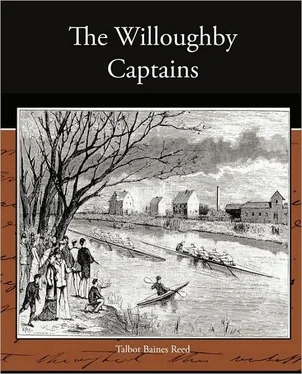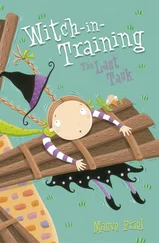Silk, with a triumphant sneer, turned and led the way, followed by his chafing victim, who devoutly wished he had never thought of coming to see Riddell at all.
When they were in the study, Silk turned and said, “All I want to say is, that, I don’t choose for you to be going such a lot to Riddell. I don’t like him, and you’d better keep away.”
“Why?” faltered Wyndham. “It doesn’t do you any harm.”
“How do I know you don’t blab all my secrets to him, eh?”
“Oh, I wouldn’t do it for anything. I promised you and Gilks.”
“Bah! what’s the use of that? You go and tell him everything you do yourself, and of course he knows it means us as well as you.”
“No, he doesn’t — really. I’ve never said a word to him about — about Beamish’s.”
“It’s a good job you haven’t; and you’d better not, I can tell you.”
“I won’t,” said the boy.
“I don’t choose to have my concerns talked about to anybody,” said Silk, “I suppose it was he put you up to cutting me.”
“No — that is,” said Wyndham, “yes, he did advise me not to be so much with Gilks and you.”
“He did?” exclaimed Silk, in a rage. “I thought so; and you—”
Fortunately at this moment Tucker and one or two other of the noisy Welchers broke into the room; and in the diversion so created Wyndham was thankful to slip away.
This, then, was the end of his good resolutions and the hopes they had fostered! He was as much in the power of this bad friend as ever — nay, more, for had he not that very evening been forced to renew the one promise which kept him from confiding everything to Riddell?
He proceeded dejectedly to the captain’s study, his cricket enthusiasm strangely damped, and the load of his old short-comings heavy upon him.
Riddell, who was pacing the room moodily, stopped in a half-startled way as his visitor entered.
“Do you want me?” he said.
“No,” said Wyndham. “I only just came across to see you, because I thought you’d wonder what had become of me.”
“Yes,” said Riddell, trying to compose himself, “with all this cricket practice there’s not been much chance of seeing one another.”
“No,” replied Wyndham, whom the very mention of cricket was enough to excite. “I say, wasn’t it an awfully fine licking we gave them? Our fellows are crowing like anything, and, you know, if it hadn’t been for your catch it might have been a much more narrow affair.”
“Ah, well! it’s all over now,” said Riddell; “so I suppose you’ll come and see me oftener?”
“I hope so. Of course, there’s the second-eleven practices still going on for the Templeton match, but I’ll turn up here all the same.”
Riddell took a turn or two in silence. What was he to do? A word from him, he felt, could ruin this boy before all Willoughby, and possibly disgrace him for life.
He, Riddell, as captain of the school, seemed to have a clear duty in the matter. Had the culprit been any one else —had it been Silk, for instance, or Gilks — would he have hung back? He knew he would not, painful as the task would be. The honour of the school was in question, and he had no right to palter with that.
Yet how could he deal thus with young Wyndham? — his friend’s brother, the fellow he cared for most in Willoughby, over whose struggles he had watched so anxiously, and for whom, now, better resolves and honest ambitions were opening up so cheery a prospect. How could he do it?
Was there no chance that after all he might be mistaken? Alas! that cruel knife and the memory of that evening crushed out the hope. What could he do? To do nothing would be simply adding his own crime to that of another. If only the boy would confess voluntarily! Could that have possibly been the object which brought him there that evening? The last time they had talked together, even in the midst of his contrition, he had been strangely reserved about something in the past. Might not this be the very secret he had now come to confide?
“How have you been getting on the last week?” he asked, gravely. “Have you been able to keep pretty straight?”
“Yes, I hope so,” said Wyndham. “You see, this cricket doesn’t give a fellow much chance of going wrong.”
“No; but of course one needs to do more than merely not go wrong,” said the captain.
“What do you mean?”
“I suppose when any of us has done wrong we ought to try to make up for it somehow.”
“Oh, yes, of course,” said Wyndham, feeling a little uncomfortable. “The worst of it is, you can’t always do that except by keeping right in future.”
“Supposing you had owed some fellow a sovereign last term, you would consider that all you had to do was not to owe him any more this term?” said Riddell.
“No; of course not! I’d have to pay him, I know,” said Wyndham.
“Well, what I mean,” said the captain, “is that — that — why, the fact is, Wyndham,” said he, “I’m afraid you have still some old scores you ought to clear up.”
Wyndham looked hard at the captain, and coloured.
“I see what you mean,” he said, in a low voice. “I know you’re right. I wish I could do it.”
“You wish!” exclaimed Riddell. “Wishing will not do it.”
Wyndham looked hard at him once more, and answered, in agitated tones.
“I say, Riddell. Do you know about it, then?”
“I think I do.”
At that moment a bell began to sound across the quadrangle.
“That’s lock-up; I must go!” exclaimed Wyndham, wildly. “For goodness’ sake, don’t tell any one, Riddell! Oh what a fool I have been!”
And next moment he was gone.
Riddell continued to pace the room, half stupefied with bewilderment and misery.
“For goodness’ sake, don’t tell any one!” The cry rang in his ears till it drove him nearly mad.
Poor Wyndham! What must his state of mind be? What must it have been all this time, with that miserable secret lurking there and poisoning his whole life? And yet the chance had been given him, and he had clung to the secret still, and in the face of discovery had no other cry than this, “For goodness’ sake, don’t tell any one!”
That evening, so jubilant all over Willoughby, was one of the most wretched Riddell ever spent.
Chapter Twenty Six
An Explosion of “SkyRockets.”
Parson, Bosher, King, and the other Parrett’s juniors were in bad spirits. It was not so much the Rockshire match that was preying on the brotherhood, grievous as that blow had been. Nor were they at the present suffering under any particular infliction, or smarting under any special sense of injustice. Their healths and digestions were all tolerably good, and the mutual friendship in which they had been wont to rejoice showed no signs of immediate dissolution.
The fact was, they didn’t know exactly what was the matter with themselves. They could not pretend that it was remorse for the little amount of work they had done during the term, for they stoutly denied that they had done little. On the contrary, they insisted that they were being crammed to a shameful extent.
Nor was their conscience reproaching them for their past transgressions. Of course, they could not help admitting that they had occasionally got into rows lately, but, as every one knew, it was never their fault. It had always been owing to some accident or piece of bad luck, and it was quite enough to get punished for it, without being expected to reproach themselves for it.
No. When they came to think of it they didn’t see that they had anything to reproach themselves with. On the whole, they were more to be pitied than blamed. They invariably meant well, but they never got any credit for their good intentions, while they were everlastingly getting into trouble on account of their ill-luck!
Читать дальше












